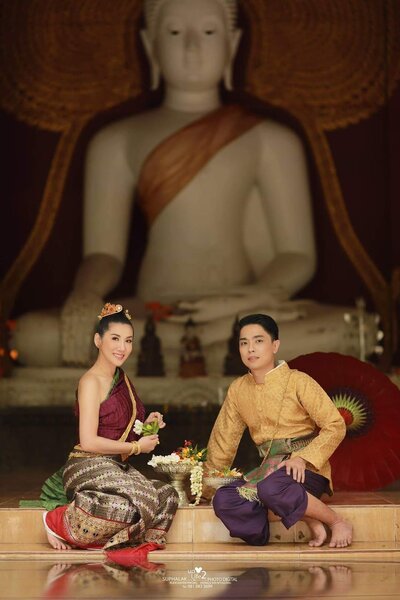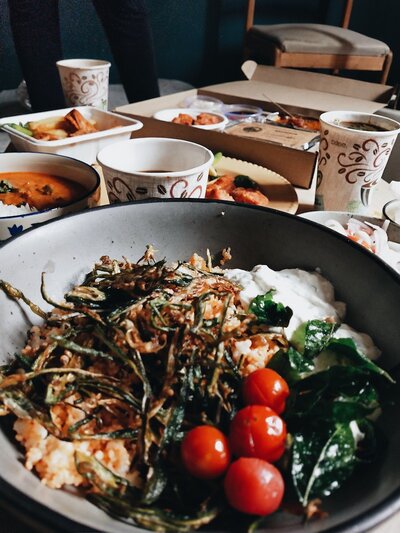This February, we prove that love knows no bounds as we chat with interracial couples about how they met, overcame cultural differences and deal with stigmas about borderless relationships.
All it takes is a meek “hi” for two worlds to meet. At a crowded college orientation camp, Hazel spotted Suraj from afar and eventually introduced herself. The two bumped into each other a few more times — sometimes by chance, sometimes by will. “Sometimes, when I saw him from a distance, I will purposely walk to him and say ‘Hi!’, as though it’s like a ‘coincidence,’” Hazel shared. Little did she know, Suraj is also a master of “chance encounters”. “We often meet at Dover MRT station (in Singapore) before walking to class together. There were times that I would be late so I would take a cab to the train station to appear as if I took the train so that I can see her there,” Suraj said. Fast forward to today, Hazel who is of Chinese descent and Suraj who came from an Indian background have been together for almost 15 years and are about to celebrate their third wedding anniversary in May.
It was a similar start for Daryl and Linda. On the last day of his holiday in Bangkok, Daryl decided to head downtown for lunch and just walk around The Paragon. It’s a popular shopping destination among his colleagues back in Singapore so he decided to check it out on a whim. While strolling around, Daryl bumped into Linda accidentally, knocking her files to the floor. “I quickly apologised and picked the scattered files up and asked if she got hurt,” he said. Daryl introduced himself but Linda can’t stay for a chat. “She was rushing for an appointment, so she gave me her name card instead,” Daryl shared. That night, they met for dinner. There was some language barrier but it was easily overcome. “My wife does understand some basic English and I do understand some common Thai words,” Daryl said. When needed, there’s always Google Translate. The dinner date went smoothly and one year after this serendipitous meeting, they got married.

Linda and Daryl dressed for their pre-wedding photoshoot.
For Sabrina and Matt, it was a match on a dating app that brought them together. “We are not ashamed to say that we met on Bumble,” Sabrina said. Truly, modern technology has played a role in bringing together people who would have not met in real life. It opens us to new possibilities. And for Sabrina and Matt, it introduced them to the love of their lives. Despite the cultural differences — Sabrina coming from an Indian Muslim background and Matt from a British one — the two got along really well and made it official in August 2019. Their wedding date is six months from now.
These three lovely couples may have had their happy ever after now, but getting there wasn’t always easy. It took a lot of understanding, adjustments and willingness to adapt to each other’s cultures. Whether it’s learning the proper honorifics of another language or moving to a new country, these couples have put in the effort in the name of love.
A cultural exchange
Getting the stamp of approval
After meeting each other, it’s time to meet the parents. While often depicted as a comedic situation in movies, the real-life experience of meeting the parents of interracial couples isn’t something one can easily laugh off. In fact, it involves some serious preparations. Hazel’s mum had some worries about her dating Suraj, but after her family met him, the uneasiness abated. “I prepared Suraj well. I told him that when meeting my family, he needs to ensure that he calls them ‘aunty’ or uncle’ (general honorifics that overseas Chinese often use to properly address elders), and they need to hear him call them, else they will think he is very rude and not a good boy,” Hazel shared.
In Chinese culture, honorifics can be complicated. You have to consider whether someone is from the paternal and maternal side and the terms also differ depending on the gender and order of birth. “I had to adjust to the strict ways of making sure to call each relative in the family whereas for mine, we are not that particular,” Suraj said. Suraj’s efforts paid off and he became well-loved in Hazel’s family and circle of friends.
For her part, Hazel shared that she didn’t have any major adjustments except for one: dealing with the inherent openness among family members. “In Indian culture, they are always sharing personal news and updates to their families and extended families. Their families are always very involved in a lot of things. In addition, they are usually involved in a lot of gatherings and events even if they are not that close to them. Whereas, I don’t really share a lot of things directly with my extended family unless it’s a major thing. And on my end, I usually don’t attend and prefer not to attend events or gatherings if I’m not close to the person or if I don’t know them,” she shared.

It’s always a feast for Indian family gatherings. (Photo from: Saundarya Srinivasan via Unsplash)
Getting the stamp of approval from each other’s family is also important to Sabrina and Matt. It was a good thing that Matt has spent close to seven years living in Singapore and has worked in Brunei before so he already has some familiarity with Sabrina’s culture. “My parents are conservative Muslims. I’m blessed in a way that Matt is so good at adapting and understanding my culture,” Sabrina shared. “The approval was so important to me as I’m really close to my parents. And it was a huge thing for my dad but he immediately got along well with Matt which was perfect for me.” As for Sabrina, she has yet to meet Matt’s family but she has been in contact with them via calls and texts and they’ve gotten along really well. Recently, they’ve even started celebrating Christmas together virtually.
Personal decisions inspired by love
But not all adjustments are influenced by others, some are personally driven. For Suraj, converting from Hinduism to Christianity was a very personal choice. “When he told me he accepted Christ, I was surprised, and I even asked if it’s because of me, or did he really experience God, as I felt religion is something very personal,” Hazel shared. “But he assured me that it was his own decision and he did experience God personally, that’s why he made that decision.”
Singaporean Daryl also made a big personal choice: moving to Thailand. “When I first went to my wife's hometown in Chiang Rai, her family was very friendly to me. It was a new world, and I was amazed by the natural landscape of Phu Chi Fa (a mountain in Thailand), an incredible view that I will not forget. It’s located near the border with Laos sloping towards the Mekong River,” he said. Before meeting Linda’s family, Daryl had to master the Thai social etiquette of “Wai”. “It’s mostly used when greeting each other with respect,” Daryl explained. “And when it’s Father’s or Mother's Day, we need to kneel and bow down to pay respect to our elders.”

Thailand became Daryl’s new home. (Photo from: Sebastian Pichler via Unsplash)
Aside from that, as a recent immigrant, Daryl had to deal with Thailand’s transportation system which is less centralised than Singapore. Certain products that he’s used to having can be difficult to find in his new country and at times the language barrier is still a challenge, like when ordering food. Thankfully, both Daryl and Linda’s families were very supportive of their union and guided them through the move.
Let them stare
These days interracial marriages are becoming more common, but unfortunately, some stigma surrounding it is still palpable in the present day. It may not come in the form of overt racism anymore, but it’s still there in subtle ways — from passive-aggressive remarks to blatant stares.
Around the time Hazel and Suraj dated (2005-2010), interracial relationships were not as common in Singapore. “We don’t often see Indian and Chinese couples holding hands in public, so when we were in the MRT or bus, people were always watching us and it felt like they were judging us, especially the older generation,” Hazel said. One time, someone approached Suraj and jokingly commented, “Hey, can you Indians stop stealing our Chinese girls from us?” It was meant as a “light-hearted friendly banter” but deep down Suraj found it “pretty upsetting.” “But these did not deter us and whenever I noticed people staring I will stand strong and proud to be in this relationship and brush it off. Because at the end of the day, our happiness matters more than anything,” Suraj said.
Even today, a decade after, Sabrina shared that she and Matt still encounter stares from strangers. “I feel like sometimes, outsiders do look at us and I don’t know what they are thinking but I hope it’s good,” she shared and remarked that Singapore is very accepting so she doesn’t feel judged or stereotyped and think of it as people just being curious. “When we meet others, I think most of our friends or family are interested to know how we met one another and those types of questions.”
At the end of the day, these couples just let them stare. “I think when you love someone, what others think is secondary,” Daryl said.
Meeting of two worlds

The meeting of two cultures. (Photo from: Hian Oliveira via Unsplash)
While being in an interracial relationship comes with a unique set of problems, it also comes with special perks — mainly getting to experience and embracing another culture. “I love that their culture is always so colourful and vibrant, and music and dance is always a key thing in festivals and events, and they are always up to dance no matter the occasion. I also love Indian food,” Hazel said.
Suraj shared that he’s also been endeared to the food from Hazel’s culture. “Cai Png (vegetable rice) is life, it is the best meal ever which is a good combination of a balanced diet without the tummy ache,” he said. But aside from that, he also admires the Chinese culture and its profound respect for elders. “The respect for elders is very strong in the Chinese culture, which I admire and have applied to how I treat my own relatives as well. I find myself being more deliberate in greeting each relative when visiting them and making sure to not just give a big wave and hide. I learnt to be very independent, because in Indian households sons are usually doted on all the way. I knew this will not be fair to expect the same treatment so I adjusted and it made me a better person who contributes to the relationship fairly as well.”
Daryl has also learned to embrace Thai culture and even watches local shows to improve his fluency in their language. “The sound of the pronunciation is quite critical. Watching Thai TV dramas do help. Now, I’m watching Club Friday The Series with my wife,” he said.
And as for Linda, she has come to love celebrating Chinese New Year. “We get to meet each other’s families and I get to buy new cardboard stickers to decorate the house. But unfortunately, due to COVID-19, things aren't easy for families to meet up this year,” she said.
Even Sabrina who hasn’t met with Matt’s family yet felt welcome to be part of their British holiday traditions. “I absolutely love how Matt’s family would send us cards over Christmas. It may be really old school to some people, but not for me,” she said. Matt, for his part, has grown to love the food, traditional attires and togetherness in Sabrina’s culture.
These three couples are a testament that even though we come from different backgrounds, mutual respect and love are what will bridge any divide.
(Cover photo from: Joanna Nix-Walkup via Unsplash)
Comments, questions or feedback? Email us at [email protected].








